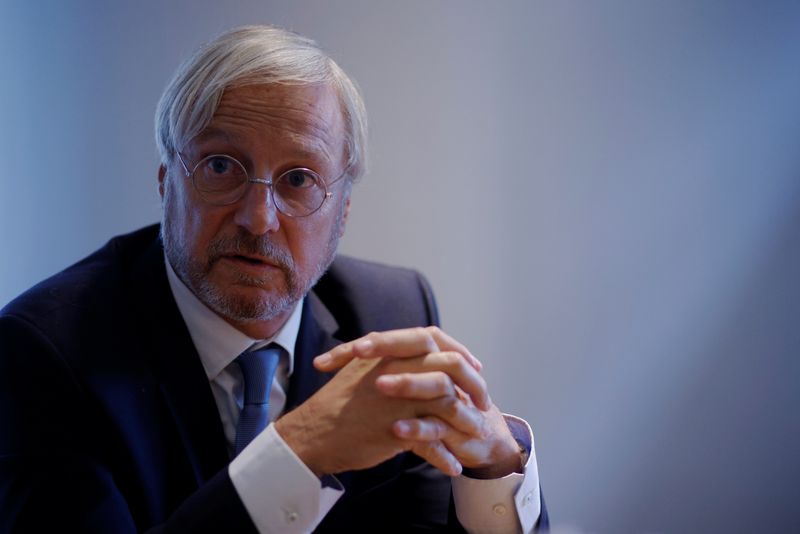
© Reuters. FILE PHOTO: Airbus Chief Commercial Officer Christian Scherer is interviewed by Reuters at the International Air Transport Association’s Annual General Meeting in Boston, Massachusetts, U.S., October 4, 2021. REUTERS/Brian Snyder/File Photo
BA
+0.54%
Add to/Remove from Watchlist
Add to Watchlist
Add Position
Position added successfully to:
Please name your holdings portfolio
Type:
BUY
SELL
Date:
Amount:
Price
Point Value:
Leverage:
1:1
1:10
1:25
1:50
1:100
1:200
1:400
1:500
1:1000
Commission:
Create New Watchlist
Create
Create a new holdings portfolio
Add
Create
+ Add another position
Close
By Tim Hepher
PARIS (Reuters) -Airbus is appointing sales chief Christian Scherer as head of its core planemaking business in its biggest management revamp for years, as it juggles supply pressures with challenges in defence and space, industry sources said.
The move, to be announced within days, frees CEO Guillaume Faury to focus on broader strategy after four years of doubling up as planemaking boss, notably during the pandemic.
Reuters revealed the plans to reorganise in July and this month Scherer, an Airbus veteran currently serving as chief commercial officer, emerged as one of the main candidates to run the jetmaking arm, which accounts for 70% of revenue.
Airbus declined to comment.
The shake-up leaves some room for further gradual renewal of operational leadership amid possible retirements, said the sources, who declined to be named as the talks are confidential. The board has said it is focused on succession planning.
Airbus reorganisations are more sensitive than most because of a history of friction between founders France and Germany. Since 2019, Faury has run the group and its largest segment.
Scherer’s appointment heralds broad continuity inside the world’s largest jet producer, which competes with Boeing (NYSE:BA).
But it also restores a system of separate leaders at the group and airplane business, which was abandoned in 2019 after a politically charged power battle between Fabrice Bregier and CEO Tom Enders, both of whom eventually stood down.
Governance concerns have cooled under Faury, whose tenure has been dominated by the response to worldwide groundings during the pandemic followed by a snapback in demand, as well as a drive towards industrial transformation and decarbonisation.
Still, the appointment of a high-profile German-born executive avoids doubling up French control at the top of the company – a potentially awkward footnote its board was seen as keen to avoid.
“It is a relatively low-risk move and minimises any political blowback to the extent that was one of the concerns,” said Vertical Partners analyst Rob Stallard, noting that the reorganisation is built around well-established leadership.
INDUSTRIAL CHALLENGES
Bruno Even, who succeeded fellow Frenchman Faury as head of Airbus Helicopters and had been seen as another candidate for the new role, will stay at the world’s largest commercial helicopter maker where sales and margins have steadily risen.
Born in Germany and raised in Toulouse, 61-year-old Scherer has spent his career in the Airbus commercial arm, apart from stints in Defence and as CEO of turboprop affiliate ATR.
The son of one of Airbus’ pioneers – who took part in its maiden flight in 1972 as a flight-test engineer as Europe sought to challenge U.S. dominance of the jet market – Scherer led negotiations to build Airbus jets on U.S. soil and persuaded the company to build the upgraded A320neo, which won record sales.
Airbus is in the early stages of defining strategy for the next generation of jets, expected in the mid-2030s and likely to shape its footprint and competition with Boeing and upcoming rival China for decades. Chancellor Olaf Scholz said on Monday Germany wanted to attract further investment for the project.
Insiders say the immediate challenges Scherer faces will be less familiar industrial ones, such as meeting production and delivery targets and managing roughly 80,000 Airbus employees.
Airbus has missed or softened several performance targets since the pandemic but has shown signs of turning the corner over the summer, with deliveries rising and some of the key supply chain indicators like missing parts said to be improving.
Source: Investing.com






























